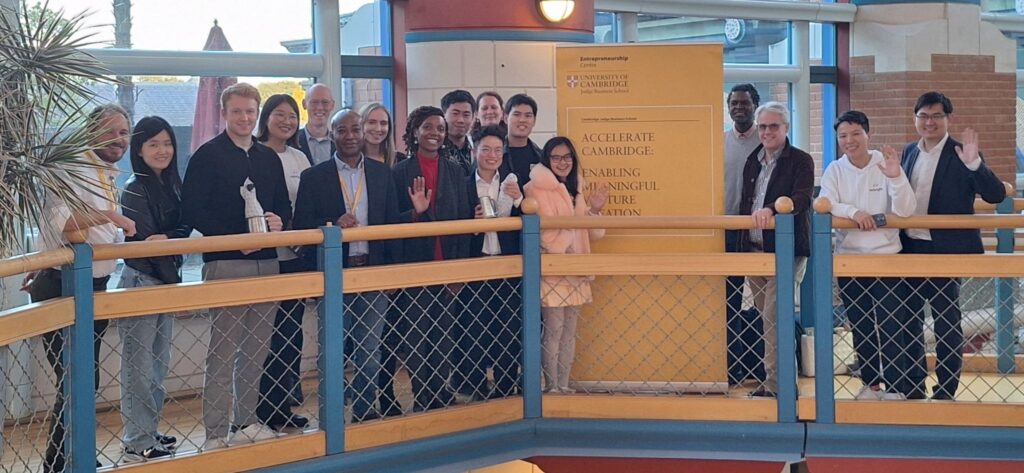By Sam Ofori

Starting and scaling a venture requires vision, strategy, resilience, and of course, capital. As technology has transformed how value is created, entrepreneurs are rising to new challenges and global market opportunities. In fast-evolving entrepreneurship landscapes and dynamic global markets, fundraising is now central to the CEO’s skill set. The ability to make a strong case for funding will be a determining factor in how businesses move from one key milestone to the next. The laser focus on funding however may sometimes get in the way of building strong, sustainable value, underpinned by unshakeable foundations. Re-directing the laser to a medium-to-long term diversified funding strategy, derived from an equally diversified revenue mix and model, might just be a surer way to a successful ten-year exit result.
Fundraising is a project – and a journey
It’s perhaps no secret that fundraising is a complex journey, often with several twists and turns, highs and lows. From deciding your medium-term capital needs, to building strong business and risk models, and the compelling value and investment story, to building early relationships with funders, it requires and demands your full attention. It is a major project in itself. Thinking like an investor is a good place to start. Continuously fine-tuning the assumptions to your financial forecasts helps your thinking – and presenting your investment case. A good understanding of the legalese always helps. Then come term sheets, investment committees, and the subjectiveness of investor preferences. Holding your ground under intense questioning, making your case in 3-minute unscheduled demo day slots and ‘car park’ opportunities, are all skills and tools you will forever need to develop and continually sharpen.
Coaches and mentors at Accelerate Cambridge help you develop and sharpen these skills, and many more. This dedicated team go above and beyond to provide the all-round support you need to give your idea a good chance of it thriving in the marketplace. They take the time to understand your mission and motivation, shaping your thoughts and empowering you to convert your passion into an investment-ready venture. The two Pre Accelerate and Accelerate 10-week sprints cover a host of core venture creation areas, from marketing, legal, risk, finance, intellectual property and storytelling – all designed to support you to develop a sustainable, diversified strategy. Accelerate Cambridge coaches and mentors bring a range of perspectives to your mission and help you to distill your arguments into their most basic components.
Funding options
Venture funding comes in many forms. Grants are great for getting you going, although they remain highly competitive and sometimes time-consuming to apply. They are also great because they do not dilute your equity. Small loans from family, friends and banks can also enable you get to that first all-important milestone, without giving away any share of your business. The risks in this funding approach are reputational, and banks may also require you to give personal guarantees. Business angels may be a next step. They come in when your venture is usually at its most risky stage. They help you do the heavy lifting – and can demand significant control in your company. Business angels act alone and in syndicates. Beyond cash, they can bring key contacts and open doors to various networks, sometimes globally. Venture capitalists will engage when your venture has crossed certain milestones. They come at a price, and by this stage, it is a very good idea to have a strong grasp of the financial and legal implications of inviting institutional investors to the table. There are many excellent resources online to do deep dives into specific funding areas. SeedLegals is a very good place to start from. SeedLegals provide a several useful guides and blogs on a range of fundraising topics.
Pitching Practice
Pre-Accelerate and Accelerate ventures benefit from exposure to investors across Cambridge and internationally. There are opportunities to pitch to investors, mentors and coaches, enabling ventures to build skills and confidence to engage with capital providers. Our pitching practice sessions are safe, structured and friendly environments, designed for ventures to make an investment case, and receive feedback from a panel of experienced coaches and mentors. The five sessions during each term are a highlight for many ventures – and ventures-to-be. Entrepreneurs come prepared to answer questions from both their coaches and visiting mentors. Entrepreneurs in the audience also benefit greatly from the sessions.
How I work with Accelerate Cambridge ventures

Pictured Left: Sam Ofori, Coach at Accelerate Cambridge, Cambridge Judge Entrepreneurship Centre.
I am one of five lead coaches on the Accelerate Cambridge programme at Cambridge Judge Business School, where I advise ventures across a range of sectors including deep tech and sustainability. I work with founders to transform their vision, resilience and strategy into compelling value propositions – and a strong value story. In addition to coaching, I present funding strategy workshops at Accelerate Cambridge, aimed at providing hands-on experience in fine-tuning a value proposition, defining a medium-term funding strategy, and creating a compelling venture story. The workshops enable and empower both startups and scaleups to take control of their funding journeys. Using real-life case studies, I work with participants to craft their individual stories to determine which value strategy works best for them. Ventures improve their understanding of investor communication, and how best to frame their investment case. I also challenge participants to de-risk their business models, and demonstrate how sustainable value will be created over the medium-term – with a clearly thought-through exit plan.
I have developed a number of frameworks and methodologies to help founders think through how they create and accelerate the value of their ventures. These tools and techniques focus on developing a deep understanding of how investors make decisions, the legal frameworks involved, and how best to build relationships in capital providers. I also help founders to explore their wider funding options, and to focus on developing more diversified funding strategies. Founders often do not discuss risk in their pitch decks. I work them on the risks their ventures are exposed to, which play a key role in how potential investors decide to engage with their propositions. I also help founders to explore how to develop diversified revenue streams. This is a critical factor in demonstrating traction and reducing overall venture risk. Many entrepreneurs have found this a useful component of their go-to-market strategy.
Starting and scaling a venture may have its risks, ups and downs. At Accelerate Cambridge, I focus on empowering founders to evaluate challenges and pitch compelling propositions to create sustainable value.
Author Biography: Sam Ofori
As a strategy consultant, Sam works with founders, investors and CEOs across a range of sectors, both in the UK and internationally. Recent projects include liquid hydrogen fuelling systems, knowledge exchange platforms, global executive learning, healthy ageing applications, venture creation in later life, and sustainable mining. His specialisation in venture strategy, fundraising and storytelling covers: how entrepreneurs define and structure compelling value propositions and build innovative and global business models; how they navigate their early-stage learning thresholds to transition to CEO; and how they attract and communicate with investors along medium-to-long term timeframes. Sam holds a Master of Laws degree in Venture Capital. He also mentors on a number of accelerators and entrepreneurship programmes, including: ARC Accelerator; LSE Generate (London School of Economics); UCL Hatchery (University College London); MSc Entrepreneurship (Bayes Business School); QIncubator (Queen Mary University of London); and at the University of the Arts London.


Leave a Reply